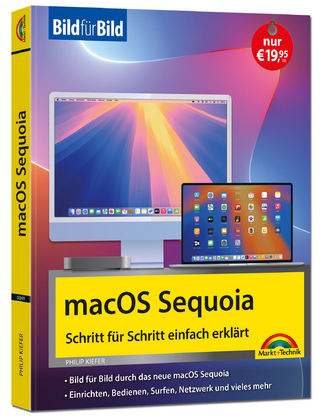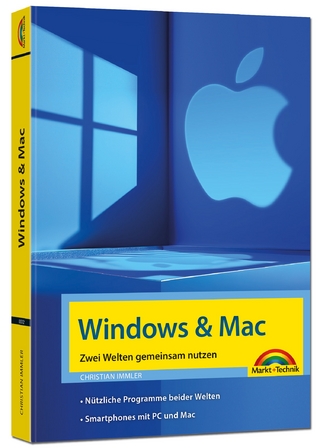
My OS X (El Capitan Edition)
Que Corporation,U.S. (Verlag)
978-0-7897-5633-6 (ISBN)
- Titel erscheint in neuer Auflage
- Artikel merken
In My OS X, you will find:
Step-by-step instructions with callouts to OS X photos that show you exactly what to do.
Help when you run into hardware or operating system problems or limitations.
Tips and Notes to help you get the most from OS X.
Full-color, step-by-step tasks walk you through getting and keeping OS X working just the way you want. The tasks include:
Managing, arranging, and tagging your files
Staying informed and productive with Notification Center
Creating and navigating virtual workspaces in Mission Control
Opening and organizing apps with Launchpad
Accessing network devices and resources
Activating and using iCloud services
Communicating online with email, instant messaging, and video
Keeping appointments with Calendar and Reminders
Planning trips and checking traffic with Maps
Keeping up-to-date with friends and family via Twitter and Facebook
Downloading and enjoying music, movies, books, and more
Sharing purchases with your family
Challenging your friends to games with Game Center
Working seamlessly with iOS Devices with Handoff and AirDrop
Protecting and securing your system and data
Expanding your system with peripheral devices
Troubleshooting common system problems
John Ray is a life-long fan of Apple products; he has been an avid Mac user since its inception in 1984. He relies on OS X both at work and at home because it is a robust, flexible platform for programming, networking, and design. Over the past 16 years, John has written books on OS X, iOS development, Linux, web development, networking, and computer security. He currently serves as the Director of the Office of Research Information Systems at The Ohio State University. When he isn’t writing, he is either re-creating a marine disaster in his living room or planning a highly elaborate electronics project that will quadruple his carbon footprint.
Prologue: Getting Started with the Mac 1
Getting to Know the Mac Hardware 2
Built-In Batteries 3
Special Keyboard Keys 4
What You Need to Know 4
The Menu Bar 5
The Dock 5
The Finder 6
Tags 7
The Launchpad 7
Mission Control 8
Spotlight 9
The App Store (and Security) 9
The Notification Center and Today View 10
System Preferences 11
Window Controls 12
Contextual Menus 13
Gestures 13
Dictation 14
Understanding iCloud and Apple ID 14
Windows Compatibility 15
Boot Camp 16
Virtualization 16
Chapter 1: Managing Your Desktop 19
Organizing in the Dock 20
Adding and Removing Items from the Dock 20
Using Folders and Stacks in the Dock 21
Configuring Folders and Stacks 22
Navigating Files and Folders in Grid Mode 23
Customizing the Dock’s Appearance 24
Customizing Finder Windows 26
Configuring the Sidebar’s System Shortcuts 26
Manually Modifying the Sidebar 27
Modifying the Finder Toolbar 28
Using Finder Window Tabs 29
Opening Tabs with a Click 30
Arranging and Grouping Files 31
Using All My Files 31
Arranging a Finder View 32
Assigning Tags 33
Removing Tags 34
Viewing Tags 34
Managing Tags 35
Previewing Document Contents 37
Viewing a File with Quick Look 38
Adding a Finder Preview Panel 40
Previewing Files Using Finder Icons 41
Finding Information with Spotlight (New!) 41
Searching for Files and Information 42
Customizing Spotlight Searching 44
Saving Searches as Smart Folders in the Finder 45
Managing Your “Today” and Notifications (New!) 47
Receiving Notifications 47
Viewing Notifications in Notification Center 48
Customizing the Notification Display 49
Activating Do Not Disturb Mode 50
Customizing Do Not Disturb Mode 51
Using Notification Center’s Today View 52
Working in the Today View 52
Managing Today View Widgets 53
Using Utilities in the Dashboard 54
Turning on the Dashboard 55
Showing the Dashboard 56
Adding and Removing Dashboard Widgets 56
Configuring Dashboard Widgets 58
Chapter 2: Making the Most of Your Screen Space 61
Swimming the Sea of Application Windows with Mission Control (New!) 62
Opening and Closing Mission Control 62
Navigating Applications and Windows 63
Creating and Populating a New Space 65
Switching Between Spaces 66
Closing a Space 67
Creating Fullscreen Application Spaces 68
Creating Split-Screen Application Spaces 69
Choosing Between Application Windows 70
Showing the Desktop 71
Configuring Mission Control Features and Shortcuts 72
Managing and Launching Applications with Launchpad 74
Starting Launchpad 75
Navigating Launchpad 76
Searching Launchpad 76
Rearranging Icons 77
Creating New Folders 78
Deleting Folders 79
Deleting Applications 80
Managing Auto Open and Save Features 81
Toggling Application Auto Open 81
Setting Window Restoration 82
Enabling Manual File Saving 83
Chapter 3: Connecting Your Mac to a Network 85
Connecting to a Wired Network 85
Making an Ethernet (Wired) Connection 86
Connecting to a Wireless Network 87
Finding and Connecting to a Network 88
Manually Choosing a Wireless Connection .90
Authenticating on a Wireless Network 91
Disabling (and Enabling) Wireless Networking 92
Manually Configuring Network Settings 93
Configuring TCP/IP and Proxy Settings 93
Activating PPPoE for DSL Connections 96
Making Connections with Cellular Data Modems and iOS Devices 98
Configuring a WWAN Modem for Use with Your Mac 98
Managing Your WWAN Connection 99
Using Your iOS Instant Hotspot 100
Creating Virtual Private Network Connections 101
Creating a VPN Connection 101
Managing Multiple Connections with Locations and Configurations 103
Creating Configurations 104
Adding and Using Locations 105
Seeking Automated Network Assistance 107
Launching Diagnostics 107
Launching the Setup Assistant 108
Chapter 4: Setting Up iCloud and Internet Accounts 113
Setting Up iCloud 113
Configuring iCloud for the First Time 114
Browsing iCloud Services 116
Activating iCloud Services 117
Exploring Unique iCloud Services (New!) 118
Accessing iCloud Applications Online 118
Using Find My Mac 119
Using iCloud Drive 121
Using Photo Sharing 126
Getting Started with Accounts 130
Adding an Account 131
Chapter 5: Accessing Email and the Web 135
Getting Started with Mail (New!) 136
Things You Need Before Setting Up an Email Connection 136
Adding an Email Account 137
Configuring Advanced Account Settings 139
Finding Your Way Around Mail 142
Reading Email 143
Composing Email 150
Managing Your Email with Mailboxes 156
Creating Mailboxes 157
Deleting and Renaming Mailboxes 158
Filing Messages in Mailboxes 159
Automatic Email Organization with Smart Mailboxes 160
Keeping Track of Your Very Important People with VIP Mailboxes 161
Searching for Messages 162
Writing Email Rules 164
Web Browsing in Safari (New!) 165
Managing Your Bookmarks, Bookmarks Menu, Favorites, Top Sites, and Reading List (Whew!) 165
Advanced Browsing Features 171
Silencing Tabs 173
Pinning Tabs 173
Adding Web Content to the Dashboard 181
Extending Safari’s Capabilities with Extensions 183
Chapter 6: Sharing Files, Devices, and Services 187
File Sharing on Your Mac 188
Configuring AirDrop 189
Sending Files with AirDrop 190
Receiving Files with AirDrop 191
Using the Share Menu to Send via AirDrop 192
Configuring Traditional File and Folder Sharing 193
Enabling File Sharing 194
Choosing File Sharing Protocols 195
Selecting Folders and Permissions 197
Setting Folder Access Permissions 198
Browsing and Connecting to Network Shares 200
Connecting to Remote Shares 202
Sharing Files via the Share Menu 203
Sharing Files via Messages 203
Uploading Files to an Online Service 204
Sharing Printers 205
Enabling Network Printer Sharing 205
Setting Printer Sharing Permissions 206
Accessing a Network Printer 207
Sharing an Optical Drive 209
Enabling DVD Sharing 209
Accessing a Shared Optical Drive 210
Sharing Your Mac Screen (New!) 211
Enabling Screen Sharing 211
Setting Screen Sharing Permissions 212
Accessing the Screen of a Local Mac 214
Accessing Remote Computers and Non-Macs 216
Sharing Your Internet Connection 218
Sharing Your Connection 218
Chapter 7: Being Social with Messages, FaceTime, Twitter, and Facebook 221
Instant Messaging with Messages (New!) 222
Adding Accounts to Messages 222
Configuring Your Account During Startup 223
Editing Your iMessage Account Settings 224
Adding a Traditional IM Account to Messages 225
Logging into (and out of) Your IM Account 226
Configuring Your IM Identity 227
Setting the Messages Picture 227
Configuring Custom Status Messages 229
Managing Your IM Buddy List 230
Adding Buddies 230
Adding Groups 231
Communicating with IM and iMessage 233
Responding to an Incoming Chat via Notification Center 234
Responding to an Incoming Chat in Messages 234
Starting a Chat in Messages 235
Starting a Chat via Notification Center 237
Using Voice or Video for Chatting 238
Starting a Voice or Video Chat 238
Sharing Your Files and Screen 239
Transferring Files over Messages 240
Starting a Screen-Sharing Session 241
Video Calls with FaceTime 242
Setting Up FaceTime 242
Placing Calls from the Contacts List 244
Receiving a FaceTime Call 245
Accessing Your Call List 246
Disabling FaceTime 247
Updating Account Information FaceTime Preferences 247
Using the El Capitan Twitter and Facebook Posting Support 249
Enabling Twitter 249
Enabling Facebook 251
Posting from the Finder and Other Apps 253
Posting via Notification Center 254
Chapter 8: Managing Who, Where, When, and What 257
Managing Contacts 258
Adding Groups 259
Creating a Group 259
Creating a Smart Group 260
Adding Contacts 261
Creating a New Contact 262
Setting a Contact Image 263
Auto Information Gathering 264
Creating “My” Card 264
Editing the Contact Template 265
Searching Contacts 266
Detecting and Merging Duplicates 267
Using iCloud and Server-Based Contacts 267
Connecting to iCloud Contacts Syncing 268
Connecting to Other Contact Servers 268
Sharing Contacts via Email, Messages, and AirDrop 270
Printing Addresses 271
Finding Your Way with Maps (New!) 272
Starting and Navigating Maps 273
Using Map Views 274
Choosing a View Mode 274
Viewing Maps with 3D Flyover 275
Finding Places 276
Finding Yourself 277
Finding Contact Entries 277
Searching the Map 279
Working with Points of Interest 279
Seeing Point of Interest Details 279
Making Your Own Point of Interest 281
Sharing a Point of Interest 282
Traveling with Maps 282
Getting Directions 283
Showing Traffic Indicators 284
Working with Schedules in Calendar (New!) 286
Adding Calendars 287
Creating New Calendars 287
Connecting to iCloud and Server-Based Calendars 289
Connecting to iCloud Calendar Syncing 289
Connecting to Other Calendar Servers 290
Subscribing to a Public Shared Calendar 292
Viewing Calendars 293
Working with Events 294
Creating a New Event 295
Using the Quick Event Feature 296
Editing Event Information 297
Sending Event Invitations 298
Accepting Invitations 299
Accepting Invitations through Notification Center 301
Confirming “Found in Mail” Invitations 301
Searching Events 302
Printing Calendars 303
Remembering with Reminders 304
Creating a List 305
Adding a Reminder 306
Setting Reminder Attributes, Including Location 306
Completing Reminders 308
Finding Reminders 308
Viewing Reminders by Date 309
Searching Reminders 310
Using iCloud and Server-Based Reminders 310
Keeping Track with Notes (New!) 311
Adding Folders 312
Adding Notes 313
Prettify Your Most Mundane Notes 313
Adding Notes from Other Applications 315
Moving Notes Between Folders 317
Searching and Displaying Notes 317
Showing Attachments 319
Sharing Notes via Email and Messages 320
Using iCloud and Server-Based Notes 320
Connecting to iCloud Note Syncing 321
Connecting to Other Note Servers 321
Chapter 9: Entertainment on the (Big) Little Screen 325
Creating a Media Library in iTunes (New!) 325
Running iTunes for the First Time 326
Finding Your Way Around iTunes 327
Interacting with Your Library 328
Controlling Playback 329
Building Your Media Library 329
Purchasing Digital Media on the iTunes Store 330
Using Genius Recommendations 332
Downloading Podcasts 334
Quick Searches 336
Setting a Search Filter 337
Using Playlists 337
Creating Playlists 337
Defining Smart Playlists 339
Accessing Playlists 341
Using the Mini Player 342
Using iTunes Radio 344
Listening to iTunes Radio 344
Creating Your Own iTunes Radio Station 345
Fine-Tuning Your iTunes Radio Station 346
Answering the “What Was That Song?” Question 347
Sharing Your Good Taste 347
Using Apple Music 348
Subscribing to Apple Music 348
Adding Songs to Your Library 350
Using Apple Music Recommendations 351
Connecting with Artists 352
Following New Artists 353
Managing Followed Artists 353
Syncing Media Between Devices 354
Syncing Purchases 354
Syncing Your Media with Your iPod, iPad, or iPhone 355
Sharing Media Between Home Computers 357
Keeping an iCloud Library with iTunes Match 359
Activating iTunes Match 359
Accessing Purchases in iCloud 361
Reading Your iBooks 362
Starting iBooks 363
Authorizing Your Mac 364
Purchasing Books 365
Viewing and Arranging Your iBooks Library 366
Browsing the iBooks Library 366
Organizing by Collection 369
Reading iBooks 371
Reading Basics 371
Using Annotations 373
Adding Bookmarks 374
Fine-Tuning Your Display 374
Getting Your Game on with Game Center 375
Signing into Game Center 376
Navigating the Me Screen 377
Managing Friends and Friend Requests 377
Sending a Friend Request 378
Responding to a Friend Request 379
Getting Friend Recommendations 380
Sizing Up Your Friends 381
Browsing by Game 383
Making and Taking a Challenge 385
Chapter 10: Installing and Managing Applications and Extensions on Your Mac 389
Mac App Store 390
Logging into the App Store 390
Browsing for Software 391
Searching for Software 392
Purchasing Software 393
Reinstalling Software and Installing Purchases on Other Macs 395
Hiding Apps You No Longer Want 396
Installing Non–App Store Applications 397
Unarchiving Zip Files 397
Accessing Disk Images 398
Sharing Purchases with Family Sharing 399
Setting Up Family Sharing (Organizer) 400
Adding a Family Member 401
Managing Family Members 404
Keeping Your Applications and Operating System Up-to-Date (New!) 405
Configuring Software Updates and Auto Downloads 406
Manually Applying Software Updates 407
Managing Extensions 408
Managing Installed Extensions 409
Chapter 11: Making the Most of Your Mac Hardware 411
Energy-Saving Settings 412
Monitoring Battery Life and Application Energy Use (MacBook Only) 412
Configuring Display, Computer, and Hard Disk Sleep 413
Creating a Sleep/Wake Schedule 415
Updating Keyboard and Dictation Settings 416
Setting Keyboard Repeat Rate 416
Changing Keyboard Illumination (MacBook Only) 417
Creating Keyboard Shortcuts 418
Activating Dictation 421
Changing Trackpad and Mouse Options 423
Setting the Trackpad Speed and Click Pressure 424
Controlling Trackpad Gestures 424
Configuring the Magic Mouse Speed 426
Configuring Magic Mouse Gestures 427
Adjusting Your Display 428
Setting Display Resolution 428
Controlling Display Brightness 429
Choosing a Color Profile 430
Calibrating the Display 431
Setting Sound Input and Output 433
Setting the Output Volume 433
Configuring Alert Sounds 434
Choosing and Adjusting an Output Device 435
Picking and Calibrating an Input Device 436
Recording Audio and Video 438
Recording Audio 438
Recording with the FaceTime HD Video Camera 439
Chapter 12: Using El Capitan with Your iDevices 443
Enabling El Capitan and iOS Communication 443
Verifying Your Wi-Fi and Bluetooth Settings 444
Using AirDrop 444
Sending Files to iOS via AirDrop 445
Sending Files to El Capitan via AirDrop 446
Using Handoff to Move Between Devices 447
Enabling Handoff 448
Handing Off from El Capitan to iOS 449
Handing Off from iOS to El Capitan 450
Using Your iPhone to Cell-Enable Your Mac 451
Enabling El Capitan Cellular Calls 452
Placing a Phone Call 452
Receiving a Phone Call 453
Text Messaging with El Capitan 454
Using Your iOS Device as an Instant Hotspot 455
Sharing Your iOS Internet Connection 455
Chapter 13: Connecting Peripherals to Your Mac 457
Connecting USB Input Devices 457
Configuring a USB Keyboard 458
Configuring a USB Mouse 459
Using Bluetooth Devices 460
Pairing a Bluetooth Mouse or Trackpad 461
Pairing a Bluetooth Keyboard 462
Connecting a Bluetooth Headset 464
Adding and Using the Bluetooth Status Menu 465
Using External Displays and Projectors 466
Extending Your Desktop to Another Monitor 466
Setting Monitor Arrangements 467
Adding the Display Mirroring Menu to Your Menu Bar 468
Using Mirrored Displays 469
Connecting to an Apple TV (or Other Device) with AirPlay (New!) 469
Mirroring Your Display to an Apple TV 470
Setting the AirPlay Apple TV Resolution 471
Extending Your Desktop to an Apple TV 472
Sharing Multimedia to an Apple TV 473
Sending System Audio to an Apple TV 473
Connecting and Using a Printer 474
Setting Up a USB Printer 475
Printing to a Printer 478
Connecting and Using a Scanner 480
Adding a Scanner 480
Scanning in Preview 481
Chapter 14: Securing and Protecting Your Mac 485
Working with Users and Groups 486
Creating User Accounts 486
Adding Accounts 487
Enabling the Guest Account 488
Applying Parental Controls 488
Creating Groups 491
Configuring General Account Security 492
Assigning File Permissions for Users and Groups 493
Tracking Passwords with Keychain Access 495
Viewing Keychain Items 496
Adding Data to the Keychain 497
Creating a New Keychain 498
Adding a Keychain Menu Item 499
Encrypting Your El Capitan Disk 500
Activating FileVault 500
Application Execution Security 501
Setting Application Execution Limits 502
Adding Network Security with the Built-In Firewall 502
Activating the El Capitan Firewall 503
Configuring Incoming Services 503
Hiding Location Information and Application Data 505
Backing Up Important Information 506
Using Time Machine 506
Activating Time Machine 507
Customizing the Time Machine Backups 508
Adding a Time Machine Menu Item 509
Recovering Data 510
Restoring a Machine from Scratch 512
Using File Versions 513
Manually Saving a Version 513
Restoring a File Version 514
Chapter 15: Troubleshooting Your System Online-only chapter
Chapter 16: Upgrading Your Mac Online-only chapter
Index 516
| Erscheinungsdatum | 30.11.2015 |
|---|---|
| Sprache | englisch |
| Maße | 209 x 228 mm |
| Gewicht | 836 g |
| Themenwelt | Informatik ► Betriebssysteme / Server ► Macintosh / Mac OS X |
| ISBN-10 | 0-7897-5633-1 / 0789756331 |
| ISBN-13 | 978-0-7897-5633-6 / 9780789756336 |
| Zustand | Neuware |
| Informationen gemäß Produktsicherheitsverordnung (GPSR) | |
| Haben Sie eine Frage zum Produkt? |
aus dem Bereich



